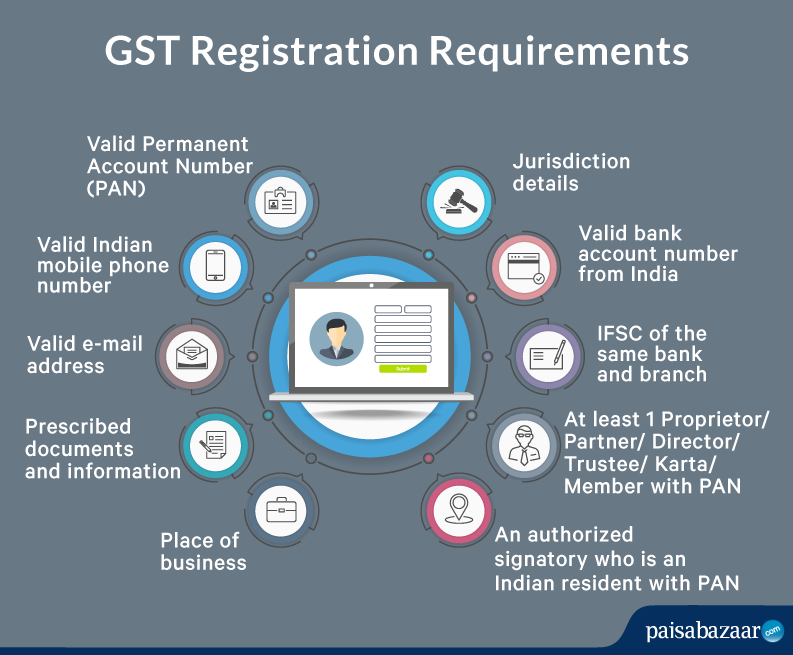How to Find the very best GST Registration Services in Singapore Swiftly
How to Find the very best GST Registration Services in Singapore Swiftly
Blog Article
From Beginning to End Up: The Ultimate Roadmap to GST Enrollment for Businesses Looking For Financial Stability
Browsing the complexities of Product and Services Tax Obligation (GST) registration is an important action for businesses making every effort for monetary security. From understanding the essential concepts of GST to following post-registration guidelines, the process can appear discouraging initially look. However, breaking down the roadmap into convenient steps can improve the enrollment trip for companies seeking to enhance their financial standing. Let's check out the necessary components that compose this ultimate roadmap and uncover just how each phase adds to laying a strong structure for financial success.
Recognizing GST Essentials
Exploring the basic concepts of Product and Solutions Tax Obligation (GST) is crucial for obtaining a thorough understanding of its effects on services and the economy. GST is a value-added tax obligation imposed on many goods and solutions for domestic usage. It has changed several indirect tax obligations that existed in the pre-GST period, simplifying the tax structure and boosting convenience of doing company in India. Under the GST system, both goods and services are tired at a particular price, which is established based on their classification. Businesses are called for to sign up for GST if their yearly turn over surpasses the threshold limit established by the government. Input Tax Credit Report (ITC) is a significant attribute of GST, allowing services to declare credit for tax obligations paid on inputs, decreasing the total tax obligation worry. Recognizing the basics of GST is crucial for organizations to adhere to tax regulations, manage their funds effectively, and add to the nation's economic development by taking part in a clear tax obligation system.
Qualification Criteria for Enrollment
To register for GST, companies should fulfill certain eligibility requirements established by the government. The primary qualification need is that any business associated with the supply of items or solutions with a yearly aggregate turnover over the threshold restriction established by the authorities need to register for GST. Since the current policies, the threshold limit for GST enrollment is a yearly aggregate turn over of 40 lakhs for businesses running within a state, other than for unique group states where the restriction is 20 lakhs. Furthermore, certain organizations are needed to register for GST irrespective of their turnover, such as interstate distributors, laid-back taxed persons, and companies reliant pay tax under the reverse charge mechanism. It is critical for services to thoroughly evaluate their turnover and deal kinds to establish their GST registration responsibilities precisely. Failing to sign up for GST when eligible can result in penalties and lawful repercussions, making it necessary for companies to adhere to the specified eligibility requirements.
Files Needed for Registration
Having fulfilled the qualification standards for GST registration, services should currently guarantee they have the requisite documents in place to proceed with the enrollment process efficiently. The files needed for GST enrollment usually include proof of business constitution, such as partnership act, registration certificate, or unification certificate for different kinds of companies. In addition, companies require to supply records establishing the primary location of organization, such as a rental agreement or electrical power costs.
Step-by-Step Enrollment Process
Beginning the GST registration process includes a series of organized actions to make certain a certified and smooth registration for companies. The primary step is to go to the GST portal and submit the enrollment kind with precise details of business entity. Following this, the applicant obtains a Temporary Reference Number (TRN) which is utilized to resume the application procedure if it's not completed in one go.
Next, all needed files as per the checklist offered by the GST portal demand to be uploaded. These papers usually consist of proof of business enrollment, identification and address proofs of marketers, monetary declarations, and business entity's PAN card.

Post-Registration Conformity Guidelines

Final Thought
In verdict, businesses seeking economic security must recognize the essentials of GST, satisfy qualification standards, collect needed papers, comply with the step-by-step enrollment process, and follow post-registration standards - Best GST registration services in Singapore. By adhering to these steps, businesses can make certain conformity with tax policies and keep financial stability in the future
In addition, certain businesses are needed to register for GST irrespective of their turnover, such as interstate vendors, informal taxable individuals, and organizations liable to pay tax obligation under the reverse charge system.Having met the visit homepage qualification criteria for GST enrollment, from this source organizations should now guarantee they have the requisite papers in place to continue with the registration procedure efficiently. The records required for GST enrollment typically consist of proof of organization constitution, such as partnership act, registration certificate, or unification certificate for various types of services. Furthermore, services need to give files establishing the principal location of business, such as a rental agreement or electrical energy costs.Commencing the GST registration process includes a collection of organized actions to guarantee a seamless and compliant registration for services.
Report this page